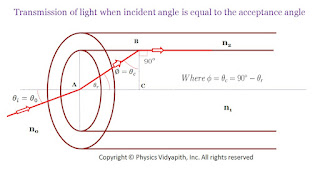Numerical Problems and Solutions of Power
1.) $P=\frac{Work(W)}{Time(t)}$
2.) $P=\frac{F.s}{t}$
3.) $P=\frac{F \: s \: cos \theta}{t}$
4.) $P=\frac{F \: s }{t} \qquad \left( \because \theta =0^{\circ} \right)$
5.) $P=F \: v \qquad \left( \because v = \frac{s}{t} \right)$
Numerical Problems and Solutions
Q.1 A woman pulls a bucket of water of mass $5 Kg$ from a well which is $10 m$ deep in 10 sec. Calculate the power used by her $(g=10 \: m/sec^{2})$.
Solution:Given that:
The mass of bucket of water $(m)=5 \: Kg$ Depth of well $(h)=10 \: m$
The time taken to pull a bucket from well $t= 10 \: sec $
The value of gravitational acceleration $g=10 \: m/sec^{2}$
The power used $(P)=?$
Now the power used by her:
$P=\frac{W}{T}$
$P=\frac{mgh}{t} \qquad \left( \because W=mgh \right)$
Now Substitute the given values in the equation of power:
$P=\frac{5 \times 10 \times 10}{10}$
$P=50 \: Joule/sec=50 W$
Q.2 A man whose mass is $50 \: Kg$ climbs up $30$ steps of the stairs in $30 \: Sec$. If each step is $20 \: cm$ high, Calculate the power used in climbing the stairs $(g=10 \: m/sec^{2})$
Solution:Given that:
Mass of a man $(m) = 50 \: Kg$
Climbs up the number of Steps $(N) = 30$
The time is taken to climb up the 30 steps $(t)= 30 \: sec$
The length or height of one step $(l)=20 cm \: = \: 0.20 \: m$
The total length or height of 30 steps $h=30 \times 0.20 \: m$
The power used in climbing the stairs=?
Now from the equation of power:
$P=\frac{W}{t}$
$P=\frac{mgh}{t} \qquad \left( \because W=mgh \right)$
Now Substitute the given values in the above equation:
$P=\frac{50 \times 10 \times 30 \times 0.20 }{30}$
$P=100 \: Joule/sec = 100 \: W$
Q.3 A horse exerts a pull of $300 N$ on a cart so that the horse-cart system moves with a uniform speed of $18 Km/h$ on a level road. Calculate the power in watt developed by the horse and also find its equivalent in horsepower.
Solution:Given that:
The horse exerts the pull i.e force $(F)=300 N$
The unifrm speed of the horse-cart $(v)=18 Km/h$
So the distance moved in $(s)=18 Km=18000m$
The time $(t)=1h= 60 \times 60 sec$
The power developed by the horse$(P)=?$
Now Substitute the given values in the above equation:
$P=\frac{3000 \times 18000}{60 \times 60}$
$P=1500 W$
$P=\frac{1500}{746}$
$P=2 \: hp$
Q.4 A man weighing $60Kg$ climbs up a staircase and carrying a load of $20 Kg$ on his head. The staircase has 20 steps each of height $0.2m$. If he takes $10 sec$ to climb, find his power.
Solution:Given that:
The weight of man $(m_{1})=60Kg$
The weight of load $(m_{2})=20Kg$
The number of steps in staircase $(N)=20$
The height of each step $(H)=10s$
The total mass of the man and load $(m)=m_{1}+m_{2}= 60+20=80 Kg$
The total heght of stair case $(h)=N \times H = 20 \times .2= 4 m$
The power of man: $P=\frac{W}{t}$
$P=\frac{mgh}{t}$
$P=\frac{80 \times 9.8 \times 4}{10}$
$P=313.6 W$
Q.5 A car of mass $2000 Kg$ and it is lifted up a distance of $30m$ by a crane in $1 \: min$. A second crane does the same job as first crane in $2 \: min$. Do the both cranes consume the same or different amounts of fuel? Find the power supplied by each crane? Neglecting power dissipation against friction.
Solution:Given that:
The mass of car $(m)=2000 Kg $
The lifted up distance $(h)=30m$
The time taken by first crane $(t_{1}= 1\: min)$
The time taken by second crane $(t_{2}= 2\: min)$
The work done by each crane:
$W=mgh$
$W=2000 \times 9.8 \times 30$
$W=5.88 \times 10^{5} J$
As both the cranes do the same amount of work, both consume the same amount of fuel.
The power supplied by the first crane:
$P_{1}=\frac{mgh}{t_{1}}$
$P_{1}=\frac{2000 \times 9.8 \times 30}{60}$
$P_{1}=9800 W$
$P_{2}=\frac{2000 \times 9.8 \times 30}{1.2}$
$P_{2}=4900 W$
Q.6 The human heart discharges $75 \: mL$ of blood at every beat against a pressure of $0.1 m$ of Hg. Calculate the power of the heart assuming that pulse frequency is $80$ beats per minute. Density of $Hg=13.6 \times 10^{3} Kg/m^{3}$.
Solution:Given that:
The volume of blood discharge per beat $(V)=75 \: mL = 75 \times 10^{-6} m^{-3} $
The pressure of blood $(P)=0.1 m \: of \: Hg$ i.e.
$P= 0.1 \times 13.6 \times 10^{3} N-m^{-2} \quad (\because P=\rho g h)$
The work done per beat $=PV$
The workdone in 80 beats$W =80 \times PV$
The power of heart:
$P=\frac{80 \times PV}{60}$
$P=\frac{80 \times 0.1 \times 13.6 \times 10^{3} \times 75 \times 10^{-6} \times 9.8}{60}$
$P=1.33 W$
Q.7 A machine gun fires $60$ bullets per minute with a velocity of $700 m/sec$. If the mass of each bullet is $50 g$ then find the power developed by the gun.
Solution:Given that:
The mass of one bullet $M=50 g$
The number of bullet $N=60$
The mass of $60$ bullets $m=M \times N= 50\times 60 = 300g= 3Kg$
The velocity of the bullet $v=700 m/sec$
The time take to fire $60$ bullets $t=1 \: min = 60 sec$
The power developed by gun:
$P=\frac{W}{t}$
According to the work-energy theorem:
$W=\Delta K$
$P=\frac{\Delta K}{t} $
$P=\frac{m v^{2}}{2t} \quad( \because K=\frac{mv^{2}}{2})$
$P=\frac{3 \times (700)^{2}}{2 \times 60} $
$P=12250 W $

